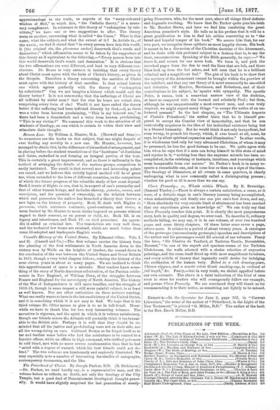The Priesthood of Christ. By Joseph Parker, D.D. (R. Dickinson.)
—Dr. Parker, we need hardly say, is a representative man, and the volume before us reflects, no doubt, not only the theology of the City Temple, but a good deal of Nonconformist theological thought gener- ally. It would have slightly surprised the last generation of steady- going Dissenters, who, for the most part, above all things liked definite and dogmatic teaching. We know that Dr. Parker quite pins his faith to Mr. Beecher Stowe, and here we find him emulating the great American preacher's style. He tells us in his preface that it will be a great gratification to him to find his critics concurring as to "the broad and hopeful temper of his book." We assure him that, for our own part, we recognise these epithets as most happily chosen. His book is meant to be a discussion of the Christian doctrine of the Atonement, and he deals with this profound subject in a fashion that is, to say the least, unceremonious. Speaking of the Bible generally, he says :—" We leave it, and return for one more look. We burn it, and pick the scorched pages from the fire to read the lines that are left, and those lines look up from the hot ashes, and tell man that he is a brilliant criminal and a magnificent fool." The gist of his book is to show that the mystery of the Atonement cannot be brought within the purview of the intellect, and that any one theory of it must necessarily be one-sided and defective. Of Maurice, Martineau, and Robertson, and of their contributions to his subject, he -speaks with sympathy. The apostle Peter, it seems, took a somewhat narrow view of the doctrine, at least as compared with the learned and scholarly Paul ; but then, although he was unquestionably a most earnest man, and even truly inspired, we might expect many things "to escape the notice of an un- lettered peasant." In the last chapter, on "The Ultimate Aspects of Christ's Priesthood," the author hints that he is himself pre- pared to accept the Comtist view of immortality, and that he can contentedly acquiesce in the idea of his individual existence being lost in a blessed humanity. But he would think it not only inexpedient, but even wrong, to preach his theory, which, if ever heard at all, must, he says, be by silent spiritual expansion and illumination." In other words, it is wholesome food only for very advanced Christians, of whom it may be presumed, he has the good-fortune to be ono. We quite agree with him when he says that if a man can bring himself to this state of mind and rejoice in it, "nothing less than the supreme miracle has been ac- complished, in the subduing of instincts, intuitions, and yearnings which seem inseparable from our nature." Dr. Parker's book is in many re- spects a remarkable one, and in none less so than as a sign of the times. The theology of Dissenters, at all events in some quarters, is clearly undergoing what is now commonly called a disintegrating process ; whether for good or ill is more than we can say.


































 Previous page
Previous page